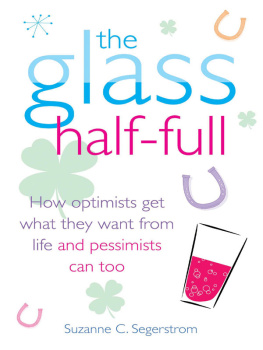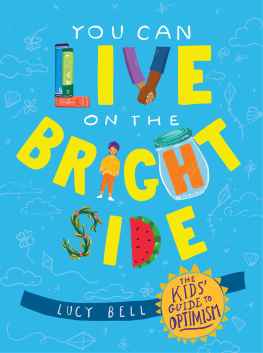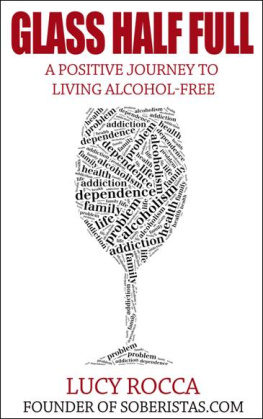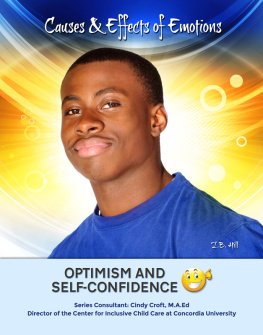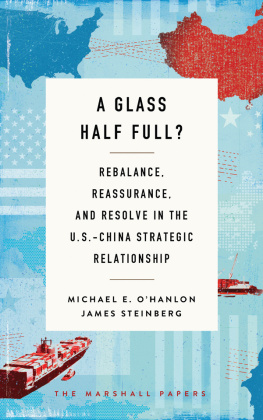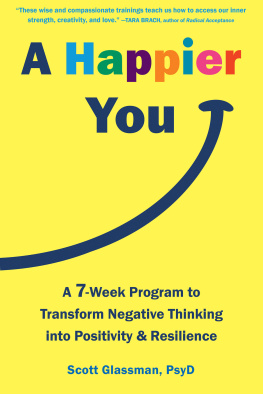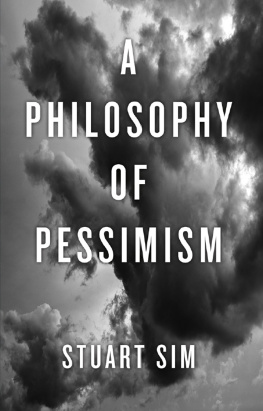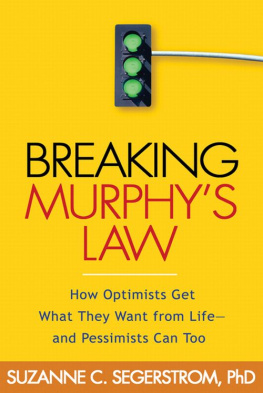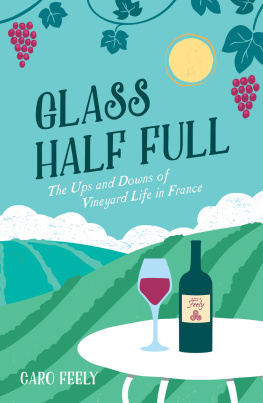THE GLASS
HALF-FULL
How Optimists Get What They Want
from Life and Pessimists Can Too
SUZANNE C. SEGERSTROM
ROBINSON
London
Constable & Robinson Ltd
55-56 Russell Square
London WC1B 4HP
www.constablerobinson.com
Text copyright Suzanne C. Segerstrom 2006, 2009
The right of Suzanne C. Segerstrom to be identified as the author of this work has been asserted by her in accordance with Copyright, Designs and Patents Act, 1988.
All rights reserved.
This book is sold subject to the condition that it shall not, by way of trade or otherwise, be lent, re-sold, hired out or otherwise circulated in any form of binding or cover other than that in which it is published and without a similar condition including this condition being imposed on the subsequent purchaser.
A copy of the British Library cataloguing in Publication Data is available from the British Library.
ISBN 978-1-84529-879-1
eISBN 978-1-78033-761-6
Printed and bound in the EU
1 3 5 7 9 10 8 6 4 2
To my husband and my lawyer,
who also happen to be my best friends
Contents
Acknowledgments
This book collects the wisdom of a community of optimism and well-being research scientists. I have had the good fortune to know and learn from many of them personally. I particularly acknowledge my mentors at the University of California, Los Angeles, especially Shelley Taylor and Margaret Kemeny; my colleagues who have provided so much intellectual stimulation and inspiration, especially fellow Akumal alumni and the Positive Psychology Network; and my students at the University of Kentucky, especially the postgraduate students whose hard work and love of learning, research, and the science of optimism have contributed so much to the ideas contained in this book.
Science is not inexpensive, and my optimism research has been supported financially by the National Institutes of Health (NIH), the Norman Cousins Program in Psychoneuroimmunology, the University of Kentucky (UK), and the Templeton Positive Psychology Prize. UK and the NIH jointly supported the sabbatical that made concentrated writing time possible. Thanks are due all of those organizations for their support.
For their parts in the inception and development of this book, I thank the principal players: Jai Giffin for thinking it a good idea, for picking up the slack during the heavy writing times, and for feeding me during the final revisions; Kitty Moore and Chris Benton for believing there was a pony in there somewhere and helping me find it; Liz Large for keeping me legally safe and personally sane; and all the readers of early chapters for their encouraging reactions (including my mum).
Prologue
Stop Trying to Be So Happy
What do you want in life? If you made a list, what would be on it? Would you want a bigger car? A bigger family? More free time? Would you want to be happier?
If one of the items on your list says be happier (or something like that), get rid of it. Dont get me wrong; theres nothing wrong with being happy. Happy feels good, for one thing. It feels so good that a lot of what people wish forthings that may have shown up on your list such as friends, power, beauty, moneythey wish for because they believe that having those things will make them happy. Not only that, but being happy may also help you get what you wish for. Happy people are more popular (cheerful, lively, and enthusiastic people have more social relationships), are more successful (happy college students have higher incomes after graduation), and may even live longer (happy novitiates were the longest-living nuns). So why not try to be happier?
Imagine that you have had a terrible day at work, and youre feeling very unhappy. On the radio on the way home, you hear about a concert featuring works by your favorite composer, who happens to be Igor Stravinsky. Egad! you think, Ill go to the concert, and Igor will cheer me right up, and then I will be happy. So you buy your ticket, and you sit down, and the music starts, and you wait to get happy.
You might have a long wait.
Surprisingly, if you hadnt gone to the concert expecting to be cheered up, you very well might have been. But your goal to get happier has sabotaged you. An experiment about the effects of trying to be happy showed that both trying to be happy and just monitoring happiness actually prevented happiness. In this experiment, participants listened to Stravinskys Rite of Spring. Some of them just listened to the music, others were told to use the music to cheer themselves up, and others just to keep track of how happy they were as they listened to the music. Surprisingly, the only way that listening to the Rite of Spring actually increased happiness was if the listener (1) wasnt trying to cheer up and (2) wasnt even keeping track of how happy she was. As you sit in the concert hall waiting for Igor Stravinsky to cheer you up, you actually guarantee that he wont. By constantly trying to get happy and monitoring whether youre happy, youre keeping yourself from getting happy.
Fun works the same way. Remember the millennium celebrations of 1999? How much fun did you have that New Years Eve? It was the biggest New Years Eve of our lifetimes, so shouldnt it have been the most fun? If youre like most people, youll look back and recall that, even though your preparations and plans may have been more elaborate, you didnt have much more fun than you usually do on New Years, and you may have had less. Research shows that people who spent more time and money to ensure a fabulous millennial New Years Eve actually had less fun than people who didnt put much effort into the evening at all. It seems that trying too hard to have fun is a sure way to kill your buzz.
Another reason to cross the happiness goal off your list: happy people often dont list be more happy among their goals. A list of goals that includes be positive, be happy, have a good attitude, or the like might indicate that that person is not already very happy or positive. Maybe this is obvious: happy people are already happy, so they dont set a goal to be happy. On the other hand, maybe its not that obvious. Consider what would happen if you substituted fitness for happiness. Fit people are already fit, but they very often have goals to remain fit by doing things like running or working out a certain number of times a week. Happiness is unlike fitness in that most happy people do not have goals specifically related to remaining happy. They dont wake up in the morning thinking about how they are going to maintain their happiness that day, the way fit people might wake up thinking about how they are going to manage to get in their daily run. The Stravinsky and New Years Eve research shows that its a good thing that happy people dont plan their happiness, because if they did, they might actually become less happy. To truly be more happy, you have to stop trying.
KILL YOUR TELEVISION
Right after you stop your pursuit of happiness, you should stop trying to free up your time. People think theyll be happier if they have more free time, but free time is overrated. Look at how American lives have changed over the past century. We have wealth and leisure beyond previous generations wildest imaginings. The washing machine! The automobile! Air travel! Computers! Television! And we have more years and better health to enjoy our leisure. Expected longevity for children born in the United States increases every year. New drugs control infections, improve our love lives, and even, like the statins that lower cholesterol, compensate for the health effects of our wealthy diet and increased leisure. Still, despite all these improvements, Americans are no happier today on average than they were 50 years ago, when they always had to do the dishes by hand and there was no such thing as permanent press.

